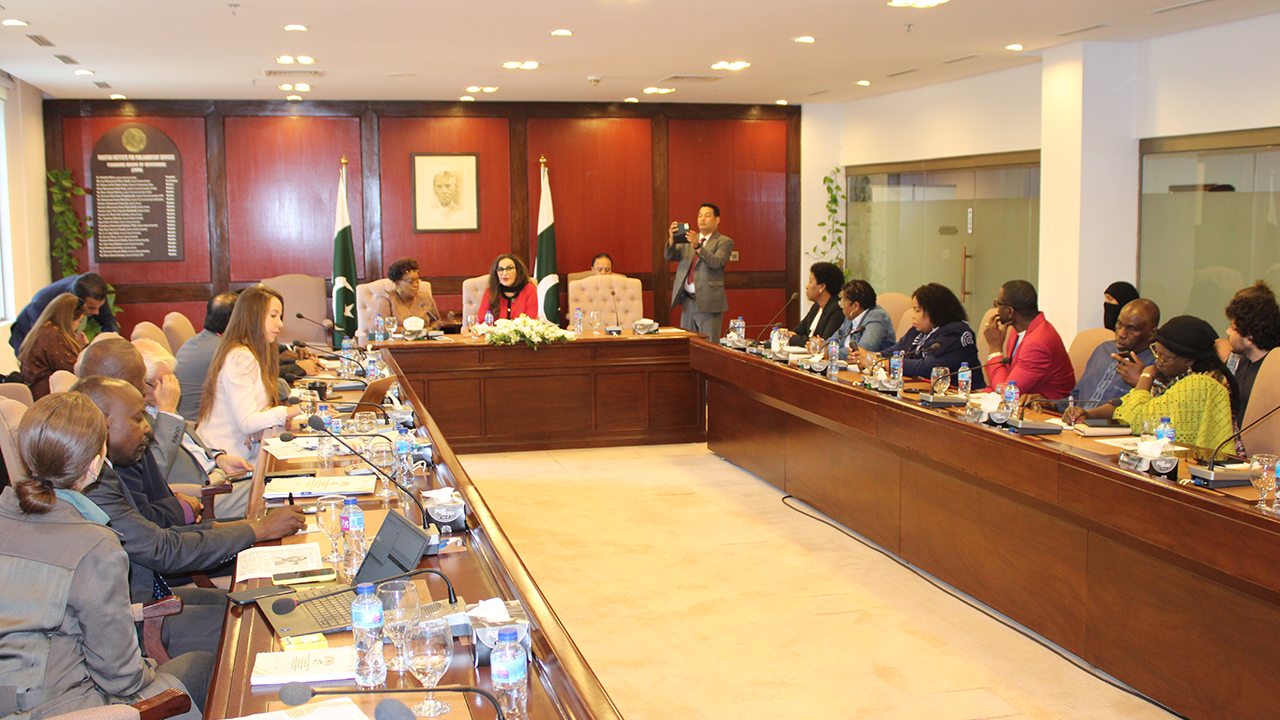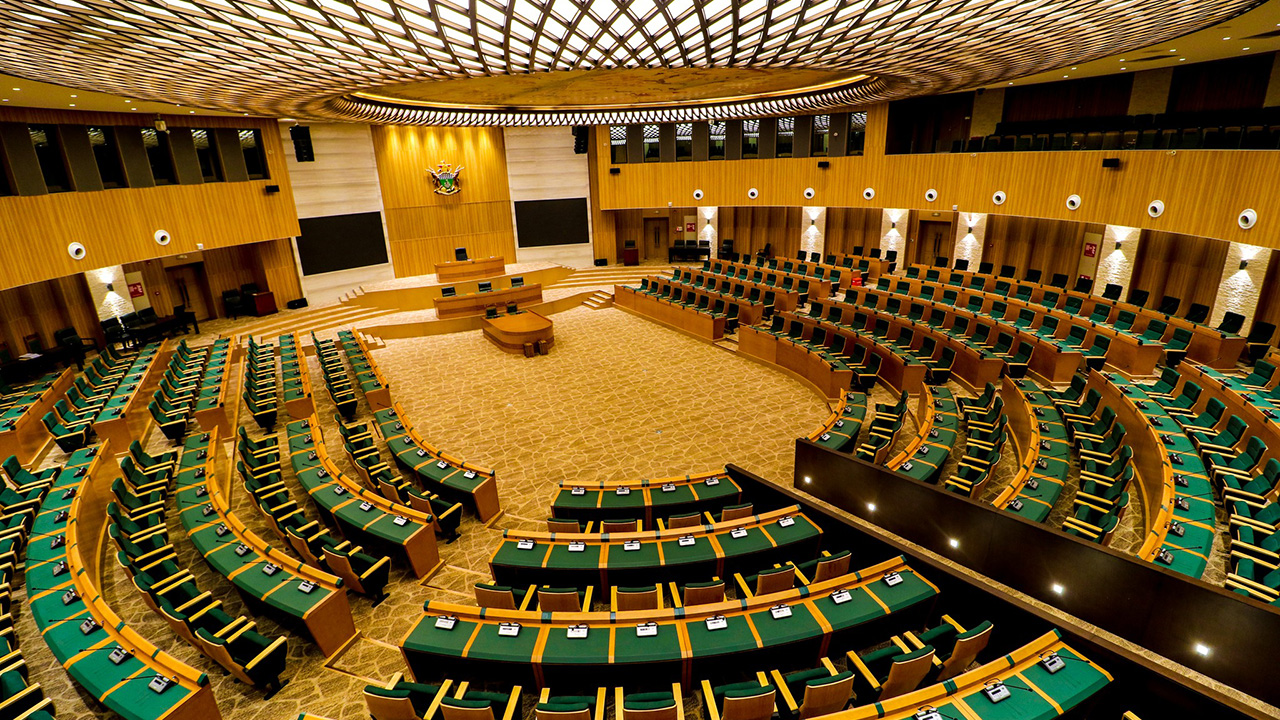
Islamabad/New York/The Hague
At the margins of the 45th Annual Forum and 13th Consultative Assembly of Parliamentarians on the International Criminal Court and the Rule of Law (CAP-ICC), PGA brought together parliamentarians from different regions around the world, to discuss and strategize towards the abolition of the death penalty. Hosted by the National Assembly of Pakistan, this meeting provided a platform for parliamentarians to share their experiences and insights on addressing ongoing challenges related to the use of capital punishment.
As underlined by Hon. Millie Odhiambo, MP (Kenya) and Convenor of PGA Campaign for the Abolition of the Death Penalty in her opening remarks, the use of capital punishment continues to inflict torture and other forms of ill-treatment, therefore violating fundamental human rights, in addition to be often used against the most marginalized and vulnerable communities. While Kenya is moving towards abolition, the use of capital punishment is still included in the Statute book. In the perspective that justice should seek rehabilitation, not irreversible punitive measures that do not effectively deter crime, this roundtable thus represented an opportunity to reflect on peer experience to move towards universal abolition.
Senator Sherry Rehman (Pakistan), Chair of PGA National Group in Pakistan, demonstrated her clear commitment in opposing the death penalty, emphasizing its ineffectiveness as a deterrent instrument, which does not provide justice and only perpetrates violence. While extremisms are on the rise in South Asia, focus should be on promoting clemency, improving judicial processes, and tackling social issues. Senator Rehman noted that public executionsexacerbate social issues and dehumanize communities.
This roundtable also offered a time for the civil society to share its perspective, briefing parliamentarians attending on the progress made in the abolitionist movement over the recent months. Ms. Frederika Schweighoferova, Director of PGA International Law and Human Rights Program, referred to recent developments, and insisted on the role parliamentarians can play in the field: the abolition needs more than just the abolition or the reduction of its scope, it is about ratifying international instrument, reverse any trend or tendencies in States that may risk to return to the death penalty, while safeguarding the human rights of those on the death row and advocating on regional and international fora for the universal abolition of the death penalty. PGA having joined the Global Consortium for Death Penalty Abolition, an initiative funded by the European Union, it can support further parliamentarians and relevant stakeholders, including local civil society organizations, to progress on the abolition in a more effective way.
Justice Project Pakistan (JPP), a leading organization advocating for criminal justice reform, has long been at the forefront of efforts to abolish the death penalty in Pakistan, which was reinstated in December 2014. Ms. Sarah Belal, its Executive Director, highlighted that thanks to continued advocacy, the scope of capital punishment in Pakistan has been limited in several key areas, with the number of executions reduced to zero since 2020. Despite this progress, JPP’s important research, mapping and monitoring have revealed a significant rise in Pakistan’s death row population. This increase can be explained by the inconsistent application by lower courts of the Supreme Court of Pakistan’s ruling, which states that the death penalty should be only applied for “exceptionally aggravated offences,” and of other recent legislative reforms, such as the Control of Narcotics Substances (Amendment) Act 2023 – which eliminated the death penalty for narcotics-related offenses. There is therefore the need to engage with the judiciary, implementing capacity-building trainings to ensure the adherence with the Supreme Court’s position and legislative amendments.
Hon. Farhatullah Babar, ex-Senator (Pakistan) and distinguished advocate for the abolition of the death penalty, delivered an eloquent reflection about its application in Muslim countries. While Shariah law permits the death penalty, notably in the cases of qisas (retaliation), its scope is limited and offers alternatives: the Quran upholds hayat (life), encouraging forgiveness, mercy, and repentance over retribution. Calling on the Pakistani parliamentarians to champion this critical discussion within the Senate and the National Assembly, Hon. Babar formulated several concrete recommendations, including fostering a national dialogue by engaging all segments of the society, establishing a dedicated parliamentary caucus on the abolition of the death penalty, legislating on antitorture measures, narrowing the scope of the death penalty, with particular focus on abolishing the death penalty for juveniles and individuals with mental disabilities.
Moving towards the African perspective, Hon. Kindness Paradza, MP (Zimbabwe), testified of the global shift against the use of capital punishment, as demonstrated by recent important progress in Zimbabwe, where a Death Penalty Abolition Bill was approved by the government and introduced in Parliament in 2023, seeking to amend the country’s Criminal Law Code and Criminal Procedure and Evidence Act to abolish the death penalty for all crimes, replacing it with imprisonment for life. Hon. Mary Navicha, MP (Malawi), also pointed at the colonial legacy that entrenched the death penalty in Malawi’s legislation, although no execution took place since 1992. Following the Supreme Court ruling declaring the death penalty unconstitutional, an important work has been led and continue to be headed by parliamentarians to entirely remove the capital punishment from its legislation.
During the interactive session, parliamentarians from different countries shared their perspectives on challenges and opportunities for abolishing the death penalty. In Jamaica for instance, Dr. Angela Brown Burke, MP (Jamaica) and member of PGA Executive Committee, highlighted the persistent use of the misleading argument is still use of deterrence to justify the death penalty, despite research debunking its role in reducing crime – thus pointing at the necessity to create platforms to inform the public opinion and foster dialogue. Hon. Roseby Gadama, MP (Malawi), described how women caucuses can serve as pioneers in driving discussions on abolition, as it has been the case in her country, which has made significant progress on this path. Hon. Ek Nath Dakal, MP (Nepal), recounted Nepal’s abolition of the death penalty in 1990, and underscored the importance of ratifying international treaties, such as the Second Optional Protocol of the International Covenant on Civil and Political Rights (ICCPR) aiming at the abolition of the death penalty. Hon. Chaudhry, MP (Pakistan) and Hon. Mirza Ikhtiar Baig, MP (Pakistan) both noted that the National Assembly will continue to consider further legislative amendments to reduce the scope of the death penalty, advancing efforts to address social inequalities and promote a more just society. Hon. Patrick Kensenhuis, MP (Suriname) shared Suriname’s experience in abolishing the death penalty, emphasizing that such a move reflects a collective commitment to upholding human rights and prioritizing rehabilitation over retribution. Hon. Fox Odoi-Oywelowo, MP (Uganda), stressed that Uganda still enforces mandatory death sentences in its legal framework, including under the controversial 2023 anti-homosexuality law, which introduced the death penalty for the so-called crime of “aggravated homosexuality.” He underscored the need to challenge laws that disproportionately target vulnerable communities. Lord Carlile, MP (UK), reflected on the United Kingdom’s journey to abolish the death penalty over four decades ago, emphasizing the role it played in fostering peace and reconciliation with Northern Ireland.
In his closing remarks, Hon. Syed Naveed Qamar, MP (Pakistan) and PGA President, reaffirmed PGA’s opposition to the death penalty under all circumstances. He urged his peers to confront and challenge cultural, national, or religious justifications for capital punishment, calling for its abolition worldwide.



